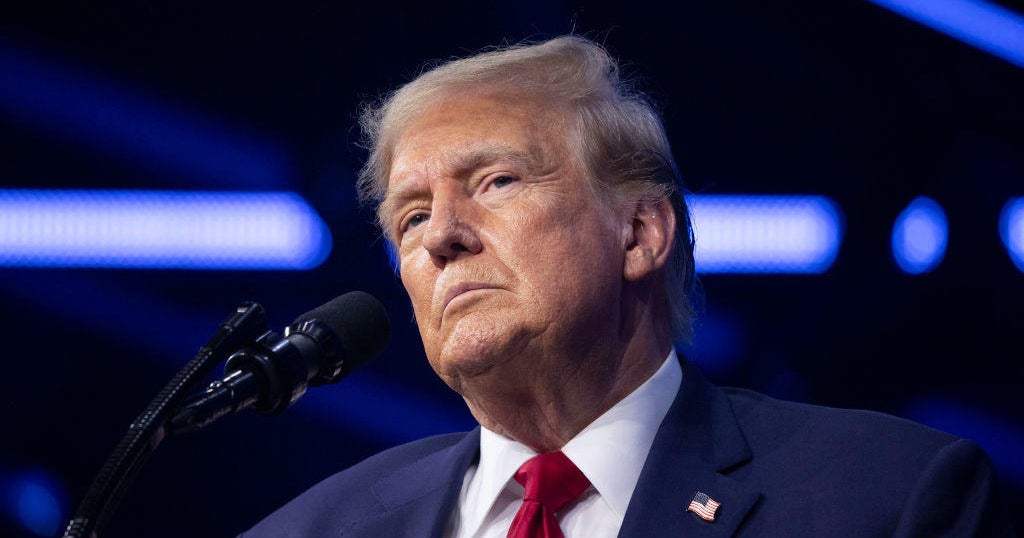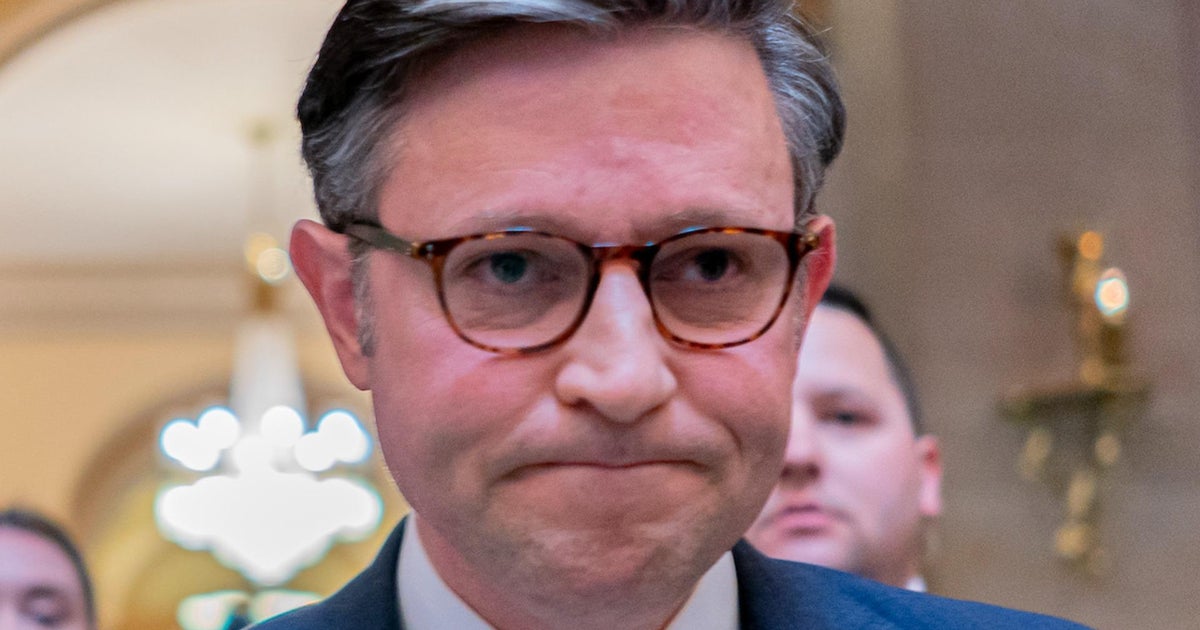CBS News
Trump will address influential evangelicals who back his candidacy but want to see a national abortion ban

Donald Trump is set to speak Saturday to a group of politically influential evangelicals who fiercely support him but would like to see the presumptive Republican presidential nominee promise to do more to restrict abortion.
Trump’s stated opposition to signing a nationwide ban on abortion and his reluctance to detail some of his views on the issue are at odds with many members of the evangelical movement, a key part of Trump’s base that’s expected to help him turn out voters in his November rematch with Democratic President Joe Biden.
While Trump nominated three of the Supreme Court justices who overturned a federally guaranteed right to abortion, he has argued supporting a national ban would hurt Republicans politically. About two-thirds of Americans say abortion should generally be legal, according to polling last year by The Associated Press-NORC Center for Public Affairs Research.
A federal ban on abortion
Ralph Reed, the founder and chairman of the Faith & Freedom Coalition that Trump will address Saturday, said people in his movement would like to see a federal ban on abortion and want Republican elected officials to be “profiles in courage” who are “articulating their strongly held pro-life views.”
But, Reed said, Trump’s positions do not put him at risk of losing any of the deep support of evangelical voters who give him “more slack in the rope than they would likely give another politician.”
“I don’t think it’s going to hurt him at all because he’s got enormous credibility on this issue,” Reed said. “He did more for the pro-life and pro-family cause than any president we’ve ever had in the history of the movement.”
Attendees at the event on Saturday echoed that.
“I would prefer if he would sign a national ban,” said Jerri Dickinson, a 78-year-old retired social worker and Faith & Freedom member from New Jersey. “I understand though, that as in accordance with the Constitution, that decision should be left up to the states.”
Dickinson said she can’t stand the abortion law in her state, which does not set limits on the procedure based on gestational age. But she said outside of preferring a national ban, leaving the issue to the state “is the best alternative.”
John Pudner, a 59-year-old who recently started a Faith & Freedom chapter in his home state of Wisconsin, said members of the movement feel loyal to Trump but “we’d generally like him to be more pro-life.”
“I think a lot, you know, within the pro-life movement feel like, well, gosh, they’re kind of thinking he’s too far pro-choice,” he said. “But because they appreciate his Supreme Court justices, like that’s a positive within the pro-life community.”
Evangelical support
According to AP VoteCast, a wide-ranging survey of the electorate, about 8 in 10 white evangelical Christian voters supported Trump in 2020, and nearly 4 in 10 Trump voters identified as white evangelical Christians. White evangelical Christians made up about 20% of the overall electorate that year.
Beyond just offering their own support in the general election, Reed’s group plans to help get out the vote for Trump and other Republicans, aiming to use volunteers and paid workers to knock on millions of doors in battleground states.
While he still takes credit for the reversal of Roe v. Wade, Trump has also warned abortion can be tricky politically for Republicans. For months he deferred questions about his position on a national ban.
Last year, when Trump addressed Reed’s group, he said there was “a vital role for the federal government in protecting unborn life” but didn’t offer any details beyond that.
In April of this year, Trump said he believed the issue should now be left to the states. He later stated in an interview that he would not sign a nationwide ban on abortion if it was passed by Congress. He has still declined to detail his position on women’s access to the abortion pill mifepristone.
In 2016, white evangelical Christians were initially reluctant to support Trump and suspicious of his image as a twice-divorced New York City tabloid celebrity who had at one point described himself as “very pro-choice.”
But his promises to appoint justices to the court that would overturn Roe, along with his decision in 2016 to name Mike Pence, an evangelical Christian, as his running mate, helped him gain the movement’s backing.
Several Republicans seen as potential running mates for Trump are also speaking at the conference, including New York Rep. Elise Stefanik, former presidential candidate and Trump Housing Secretary Ben Carson and Arizona Senate candidate Kari Lake. Stefanik and Carson are among the Republicans who received vetting paperwork from the Trump campaign in recent weeks.
Reed said members of his coalition are watching them closely and looking for Trump to pick someone who shares his views.
“We’re looking for somebody who will be a champion, a pro-family and pro-life and pro-Israel champion. And we’re looking for someone who has the ability to bring some new folks into the fold and act as an ambassador for our values,” he said.
Reed wouldn’t name any of the field as strongest or weakest, calling it “an embarrassment of riches.”
Later Saturday, Trump plans to hold an evening rally in Philadelphia.
CBS News
Drug trade in Syria allegedly tied to Assad regime’s financial gains

Watch CBS News
Be the first to know
Get browser notifications for breaking news, live events, and exclusive reporting.
CBS News
Congress veers toward government shutdown after GOP revolt led by Trump, Musk

Washington — Congress’ path forward on government funding is in limbo after House Republicans, with the support of Elon Musk and President-elect Donald Trump, torpedoed an initial deal to avert a shutdown before a Friday night deadline.
The House descended into chaos Wednesday when the GOP revolt sank a last-minute funding measure to keep the government operating through early next year.
The massive end-of-year spending legislation immediately sparked anger from conservatives when it was unveiled late Tuesday. Texas GOP Rep. Chip Roy referred to it on X as a “1,547-page Christmas tree,” while Rep. Kat Cammack, a Florida Republican, called it “a band-aid that is laced with fentanyl.”
The more than 1,500-page bill released Tuesday was far from a modest stopgap measure. In addition to extending government funding through March 14, it included disaster aid, health care policy extenders and a pay raise for members of Congress, among other provisions. The disaster relief portion of the bill came with a $110 billion price tag.
Elon Musk, the co-head of Trump’s advisory Department of Government Efficiency chimed in with a barrage of posts Wednesday calling the bill “criminal” and suggestions that Republicans who supported it did not belong in Congress. And the opposition culminated in statements from Trump lambasting the new spending and threatening a primary challenge against any Republican supporting the measure.
The president-elect called on Republicans to strip out the additional spending and added a new element instead — raising the debt ceiling. The debt ceiling, which limits how much the government can borrow to pay its bills, is suspended until the first quarter of next year, but Trump said he’d prefer to force President Biden to approve raising the debt ceiling so he wouldn’t have to sign it.
“I will fight ’till the end,” Trump wrote.
Top House Republicans met Wednesday night after the initial deal fell apart, but a new path forward remained unclear Thursday morning as Congress lurched toward Friday night’s deadline to fund the government.
Though stripping out most of the additional funding would satisfy many Republicans, Johnson is likely to need dozens of votes from Democrats, and some are already slamming Johnson for walking away from the agreement. They argue Republicans will shoulder any blame for a potential shutdown.
“Republicans have now unilaterally decided to break a bipartisan agreement that they made,” House Minority Leader Hakeem Jeffries, a New York Democrat, said Wednesday. “House Republicans will now own any harm that is visited upon the American people that results from a government shutdown or worse.”
Tom Williams/CQ-Roll Call, Inc via Getty Images
Spending fight throws Johnson’s speakership into question
The initial plan to keep the government funded and the chaos that surrounded it also prompted intense criticism of Johnson, including from members of his own party.
In addition to the slew of add-ons to the spending bill, conservatives are angry with Johnson for carrying out the negotiating process largely occurred outside of the view of rank-and-file members. Rep. Eric Burlison, a Missouri Republican, called the process “a total dumpster fire.”
A handful of Republicans indicated their support for Johnson’s speakership in the new Congress is now in question, and with such a narrow majority, it would take only a few to take him down. Rep. Thomas Massie, a Kentucky Republican, said flatly Wednesday that he won’t support Johnson in the speaker’s election.
“I’m not voting for him,” Massie said. “This solidifies it.”
In November, House Republicans backed Johnson to lead for another two years during their leadership elections. But the full chamber will vote to elect a speaker on Jan. 3. During the last speaker fight at the beginning of a new Congress in 2023, the slim Republican majority took 15 rounds to elect former Speaker Kevin McCarthy, who was ousted from the role nine months later, partly due to his handling of government funding.
Still, Johnson generally enjoys more favor than McCarthy with the president-elect, who wields widespread influence over House Republicans. Trump told Fox News Digital on Thursday that Johnson would “easily remain speaker” if he “acts decisively and tough” and eliminates “all of the traps being set by Democrats” in the spending package.
CBS News
Alicia Keys reflects on Broadway success and gives back to students at alma mater

Watch CBS News
Be the first to know
Get browser notifications for breaking news, live events, and exclusive reporting.








